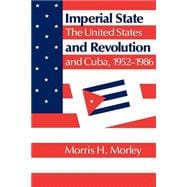
Note: Supplemental materials are not guaranteed with Rental or Used book purchases.
Purchase Benefits
Looking to rent a book? Rent Imperial State and Revolution: The United States and Cuba, 1952–1986 [ISBN: 9780521357623] for the semester, quarter, and short term or search our site for other textbooks by Morris H. Morley. Renting a textbook can save you up to 90% from the cost of buying.
| Acknowledgments | |
| 1. The US imperial state: theory and historical setting | |
| 2. The United States in Cuba 1952-1958: policymaking and capitalist interests | |
| 3. The United States in Cuba 1959-1961: national-social revolution, state transformation, and the limits of imperial power | |
| 4. The United States against Cuba 1961-1968: politics of confrontation in Latin America | |
| 5. The United States against Cuba 1961-1980: intransigent policymaking and its consequences | |
| 7. The US imperial state: some final insights | |
| Epilogue | |
| Appendix | |
| Notes | |
| Bibliography | |
| Index. |
The New copy of this book will include any supplemental materials advertised. Please check the title of the book to determine if it should include any access cards, study guides, lab manuals, CDs, etc.
The Used, Rental and eBook copies of this book are not guaranteed to include any supplemental materials. Typically, only the book itself is included. This is true even if the title states it includes any access cards, study guides, lab manuals, CDs, etc.